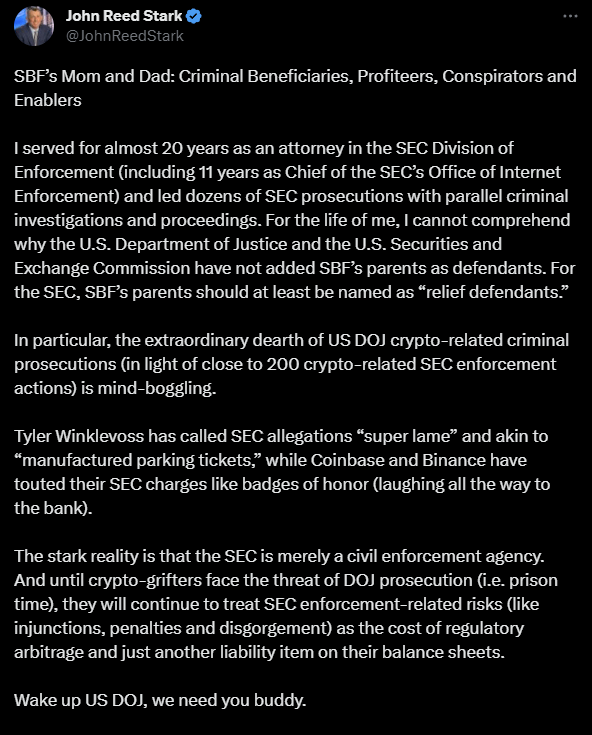John Reed Stark, a former high-ranking official at the United States Securities and Exchange Commission (SEC), has voiced his concerns about what he sees as a noticeable lack of action from the Department of Justice (DOJ) in digital-asset-related cases. One of the focal points of his concerns is the handling of individuals like Sam Bankman-Fried and his parents, whom he called “criminal beneficiaries, profiteers, conspirators and enablers.”
John Reed Stark, with almost two decades of SEC experience in Division of Enforcement, observes “extraordinary dearth” in DOJ prosecutions despite the SEC’s active enforcement actions. He explained that the SEC is merely a civil enforcement agency and can only impose so much restraint. He added:
“Until crypto-grifters face the threat of DOJ prosecution (i.e. prison time), they will continue to treat SEC enforcement-related risks (like injunctions, penalties and disgorgement) as the cost of regulatory arbitrage and just another liability item on their balance sheets.”
Stark’s Concerns
He specifically questioned why the founders of FTX, like SBF, are not being named as defendants in both DOJ and SEC cases. According to him, this draws a visible contrast between the SEC’s frequent enforcement actions and the DOJ’s limited criminal investigations and prosecutions in the digital assets space.
Stark pointed out that Gemini head Tyler Winklevoss had brushed aside SEC allegations, likening them to “manufactured parking tickets.” On the other hand, big exchanges like Coinbase and Binance regard these charges as “badges of honor.”

DoJ’s Possible Actions
Recent reports reveal the DoJ’s consideration of pressing fraud charges against Binance. However, federal prosecutors are concerned about potential consequences like market turbulence and harm to consumers following an indictment. Therefore, they are reportedly exploring alternative solutions, such as fines or non-prosecution agreements.
Meanwhile, the DoJ is restructuring its National Cryptocurrency Enforcement Team (NCET) to handle the rising number of crypto-related cases. Notably, the department is planning to make NCET a permanent unit in the criminal division focusing on computer-related crimes.










